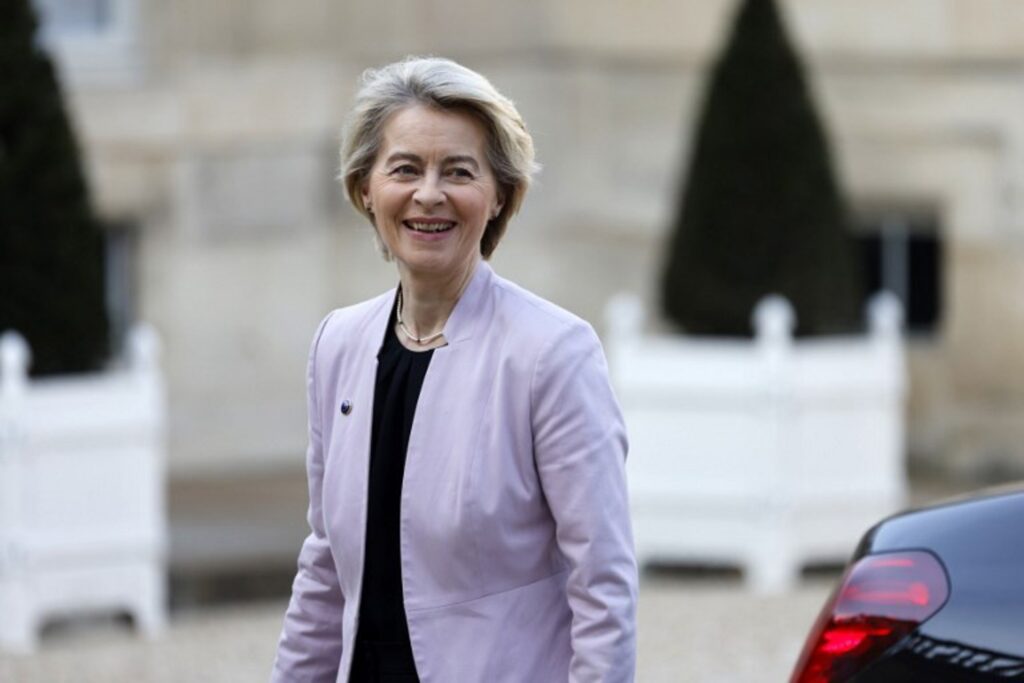European leaders attending an informal meeting held on Monday in Paris stressed that Ukraine deserves “peace through strength,” according to a joint message issued by European Commission President Ursula von der Leyen and European Council President Antonio Costa on X.
“Today in Paris we reaffirmed that Ukraine deserves peace through strength. Peace respectful of its independence, sovereignty, territorial integrity, with strong security guarantees,” von der Leyen and Costa said in a coordinated message.
“Europe carries its full share of the military assistance to Ukraine. At the same time, we need a surge in defence in Europe,” the two leaders stressed.
Europe's security is at a turning point - von der Leyen
Monday’s emergency meeting, hosted by French President Emmanuel Macron, was aimed at presenting a united front against the potential danger of being sidelined while US President Donald Trump negotiates the end of the war in Ukraine in a tête-à-tête with Russia.
Several key European leaders, including Britain’s Keir Starmer, Germany’s Olaf Scholz, and Poland’s Donald Tusk, attended the meeting at the Élysée Palace. The leaders of Spain, the Netherlands, and Denmark were also among those in attendance.
“The security of Europe is at a turning point,” Ms. von der Leyen wrote on X earlier on Monday on arriving in the French capital, where NATO Secretary-General Jens Stoltenberg was also present. “We need an urgent mindset and a surge in our defence,” she added.
All eyes on Tuesday's talks in Saudi Arabia
Before the talks began, Emmanuel Macron spoke by phone with Trump, who had caused disarray in Europe last week by conversing with Vladimir Putin, triggering major diplomatic manoeuvres regarding Ukraine. US Envoy Keith Kellogg, bound for Ukraine on Thursday, added insult to injury by hinting that Washington did not want the Europeans at the negotiation table.
Monday’s crisis meeting marked the start of a series of diplomatic moves, including unprecedented U.S.-Russia talks scheduled for Tuesday in Saudi Arabia. These discussions will focus on “possible negotiations on Ukraine,” according to the Kremlin, although US diplomacy downplayed their significance, stressing that they would not mark the start of formal negotiations.
Ukrainian President Volodymyr Zelensky is also scheduled to head to Saudi Arabia on Wednesday, having warned that his country will not recognise any agreement reached without its participation.
Divisions surface in Europe
British Prime Minister Keir Starmer announced he would meet with Donald Trump in Washington “next week.”
However, the most anticipated and dreaded meeting is between the U.S. President and his Russian counterpart, expected to take place “very soon,” according to the White House.
Before the meeting in Paris, Europe showed its divisions.
The United Kingdom, aiming to facilitate between the U.S. and Europeans, announced on Sunday that it was ready to deploy troops in Ukraine “if necessary” to support security guarantees. Sweden also stated on Monday it does not rule out deploying soldiers if negotiations lead to “a just and lasting peace.”
On the other hand, Polish Prime Minister Donald Tusk, a strong supporter of Kyiv, stated before leaving for Paris that Poland would not send troops to Ukraine, while Germany considers discussions about sending troops “premature,” preferring to wait and see if and how peace can be established in Ukraine.
Concrete steps needed to bolster Europe's security - Donald Tusk
At a security conference that ended on Sunday in Munich, U.S. Vice President J.D. Vance’s lashed out at Washington's allies in a hostile speech that stunned Europeans, prompting an immediate reactions.
A Macron advisor stressed, also on Sunday, the “need for Europeans to do more, better, and coherently for our collective security,” a sentiment echoed by Donald Tusk on Monday. Europe would not be able to help Ukraine effectively if it does not take immediate concrete steps regarding its defence capabilities, he stressed.
EU countries aim to swiftly increase military aid to Ukraine, targeting a minimum of 1.5 million artillery shells, according to several European diplomats.
However, highlighting divisions within the EU, Hungary’s Viktor Orban, close to both Moscow and Trump, criticised “frustrated, pro-war, anti-Trump European leaders” for meeting to prevent a peace deal in Ukraine.
For his part, Russian Foreign Minister Sergey Lavrov charged that Europe should be excluded from future negotiations because it wants to “continue the war.”

